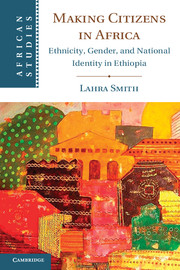Book contents
- Frontmatter
- Contents
- Maps and Tables
- Acknowledgments
- Abbreviations
- Glossary
- Maps
- Introduction
- The Challenge
- The Response
- 3 Popular Responses to Unequal Citizenship
- 4 A Referendum on Ethnic Identity and the Claims of Citizenship
- 5 No Going Back on Self-Determination for the Oromo
- 6 Ethiopian Women and Citizenship Rights Deferred
- Conclusion
- Appendix I Methodology
- Appendix II Questionnaire for Parents and Community Members (English)
- Appendix III Questionnaire for School Directors
- Appendix IV Questionnaire for Teachers
- Bibliography
- Index
3 - Popular Responses to Unequal Citizenship
Published online by Cambridge University Press: 05 May 2013
- Frontmatter
- Contents
- Maps and Tables
- Acknowledgments
- Abbreviations
- Glossary
- Maps
- Introduction
- The Challenge
- The Response
- 3 Popular Responses to Unequal Citizenship
- 4 A Referendum on Ethnic Identity and the Claims of Citizenship
- 5 No Going Back on Self-Determination for the Oromo
- 6 Ethiopian Women and Citizenship Rights Deferred
- Conclusion
- Appendix I Methodology
- Appendix II Questionnaire for Parents and Community Members (English)
- Appendix III Questionnaire for School Directors
- Appendix IV Questionnaire for Teachers
- Bibliography
- Index
Summary
In November 1999, the normally quiet trading town of Soddo in the Wolaitta region of southern Ethiopia erupted in violence. During what should have been a peaceful demonstration, police fired on unarmed protestors, and up to ten people were killed, hundreds injured, and as many as 1,000 arrested. In the wake of the protests, many teachers and other civil servants lost their jobs and many more were shuffled off to teach in other regions. The cause of the violence was the decision to combine four previously distinct languages of the region, Wolaitta, Gamo, Gofa, and Dawro, into one Esperanto-style language called Wagagoda. Suggested as early as 1992, the move by the regional authorities to force teachers and students to implement the hybrid language in their classrooms, and the refusal of the regional or central government authorities to formally address these requests, led to the demonstrations. Although the violence was short-lived, as was the effort to use Wagagoda in the classroom, the incident illustrates the potency of language identity to Ethiopians and requires explanation because it seemingly defies a strategic characterization of ethnolinguistic identity.
The challenge for scholars of citizenship and democracy in a place like Ethiopia is that language choice should be a relatively straightforward policy matter. Ethiopia is home to some seventy-five to eighty distinct language communities. It is also an incredibly poor country. It ranks 174 out of 187 countries in the world on the United Nations Human Development Index. The dominance of one language, Amharic, for most of the last century and up to the present time might also lead one to expect citizens’ language choices to reflect a desire to speak the language that guarantees the greatest access to political and economic opportunity.
- Type
- Chapter
- Information
- Making Citizens in AfricaEthnicity, Gender, and National Identity in Ethiopia, pp. 91 - 119Publisher: Cambridge University PressPrint publication year: 2013

